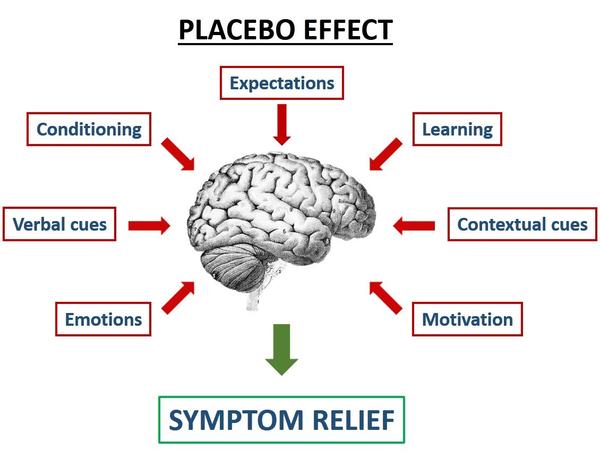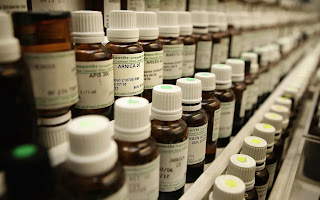Is Homeopathy scientific?
Any medicine has two ways in which it can bring about therapeutic effect - these are pharmacological means and psychological means. Let us analyse how homeopathic medicine acts.
Pharmacological means refers to the biological action of the active
ingredients (chemicals) in the medicine which brings out a therapeutic relief. After first establishing the pathology underlying the condition (or disease), the effect of drug is confirmed through scientific experiments with proper controls in place and sufficient sample size. The results are published after peer review in journals and following which these need to be replicated numerous times. Pharmacological means of action in Allopathic medicine is well established through proper scientific experiments.

On the other hand, the main concept in Homeopathy is that any ingredient (even if poisonous) are medicinal in nature at extremely low concentrations. However there is no evidence to support this claim. For instance if a homeopathic medicine has one specific active ingredient that is listed as 4C (8X) diluted on its packaging, then it implies that 1 ml of this active ingredient is diluted in 1 Billion ml (or 1 million litres) of water. This is equivalent to 1 drop of this active ingredient in a huge swimming pool. Do you think this can be effective at all? Usually active ingredients in homeopathic medicines are diluted by upto 10C (20X) - at such concentrations there is 1 atom of the active ingredient in an entire sea worth of dilutant. So in essence one is just drinking water.

On the contrary, traditional medicine of many countries contain lethal chemicals, including heavy metals like lead, arsenic, mercury, cadmium etc., at sufficiently high concentrations that lead to only harmful metal toxicity side effect without any verified therapeutic relief. This is even more dangerous than homeopathy.

Psychological means refers to the therapeutic effect as a result of "placebo effect" which arises mainly due to the faith reposed by the patient on the medicine or the healer or in oneself. The mode of action is through top-down cognitive mechanisms like will power, expectation, belief of the patient. This can bring about therapeutic effect to some degree even with just sugar pills or plain water neither of which has any active ingredients in it.

Thus, to establish the therapeutic effect of an active ingredient in any form of medicine, a proper scientific experiment requires that its efficacy be compared against an appropriate placebo and the therapeutic effect needs to be shown in more number of subjects than placebo. Otherwise such placebo effect might be misconstrued as pharmacological action of the active ingredient under test.

The therapeutic effect of approved Allopathic medicine is always established against a proper placebo. However, the so called 'scientific' papers establishing the therapeutic effect of homeopathy seldom compare against a placebo since doing so will reveal that rate of therapeutic effect is similar to placebo.
Even W.H.O. has proclaimed that homeopathy is not scientific. In 2004, Germany, origin of Homeopathy, which formerly offered it under its public health insurance scheme withdrew this since there is no scientific evidence to it. In 2017, only 2.7% of pharmacy sales were Homeopathy related. So it is not at all popular in Germany any more.
Similarly, given that there are no scientific studies establishing the therapeutic effect of traditional medicine, their success is mainly due to the placebo effect - the blind faith placed by the gullible people who believe in them or the faith healers' expertise.
Summary: Homeopathy is not scientific. Allopathy benefits through scientifically established pharmacological means of action further aided by the psychological means i.e. placebo effect. However, there is no sound science behind homeopathy and if it seems to work then it is only as effective as a placebo. Despite W.H.O. stance if someone wishes to pursue homeopathic medicine as it is effective for them, then they can do so as there are unlikely to be any side effects for taking plain water or sugar pills.
Pharmacological means refers to the biological action of the active
ingredients (chemicals) in the medicine which brings out a therapeutic relief. After first establishing the pathology underlying the condition (or disease), the effect of drug is confirmed through scientific experiments with proper controls in place and sufficient sample size. The results are published after peer review in journals and following which these need to be replicated numerous times. Pharmacological means of action in Allopathic medicine is well established through proper scientific experiments.

On the other hand, the main concept in Homeopathy is that any ingredient (even if poisonous) are medicinal in nature at extremely low concentrations. However there is no evidence to support this claim. For instance if a homeopathic medicine has one specific active ingredient that is listed as 4C (8X) diluted on its packaging, then it implies that 1 ml of this active ingredient is diluted in 1 Billion ml (or 1 million litres) of water. This is equivalent to 1 drop of this active ingredient in a huge swimming pool. Do you think this can be effective at all? Usually active ingredients in homeopathic medicines are diluted by upto 10C (20X) - at such concentrations there is 1 atom of the active ingredient in an entire sea worth of dilutant. So in essence one is just drinking water.

On the contrary, traditional medicine of many countries contain lethal chemicals, including heavy metals like lead, arsenic, mercury, cadmium etc., at sufficiently high concentrations that lead to only harmful metal toxicity side effect without any verified therapeutic relief. This is even more dangerous than homeopathy.

Psychological means refers to the therapeutic effect as a result of "placebo effect" which arises mainly due to the faith reposed by the patient on the medicine or the healer or in oneself. The mode of action is through top-down cognitive mechanisms like will power, expectation, belief of the patient. This can bring about therapeutic effect to some degree even with just sugar pills or plain water neither of which has any active ingredients in it.

Thus, to establish the therapeutic effect of an active ingredient in any form of medicine, a proper scientific experiment requires that its efficacy be compared against an appropriate placebo and the therapeutic effect needs to be shown in more number of subjects than placebo. Otherwise such placebo effect might be misconstrued as pharmacological action of the active ingredient under test.

The therapeutic effect of approved Allopathic medicine is always established against a proper placebo. However, the so called 'scientific' papers establishing the therapeutic effect of homeopathy seldom compare against a placebo since doing so will reveal that rate of therapeutic effect is similar to placebo.
Even W.H.O. has proclaimed that homeopathy is not scientific. In 2004, Germany, origin of Homeopathy, which formerly offered it under its public health insurance scheme withdrew this since there is no scientific evidence to it. In 2017, only 2.7% of pharmacy sales were Homeopathy related. So it is not at all popular in Germany any more.
Similarly, given that there are no scientific studies establishing the therapeutic effect of traditional medicine, their success is mainly due to the placebo effect - the blind faith placed by the gullible people who believe in them or the faith healers' expertise.
Summary: Homeopathy is not scientific. Allopathy benefits through scientifically established pharmacological means of action further aided by the psychological means i.e. placebo effect. However, there is no sound science behind homeopathy and if it seems to work then it is only as effective as a placebo. Despite W.H.O. stance if someone wishes to pursue homeopathic medicine as it is effective for them, then they can do so as there are unlikely to be any side effects for taking plain water or sugar pills.

Comments